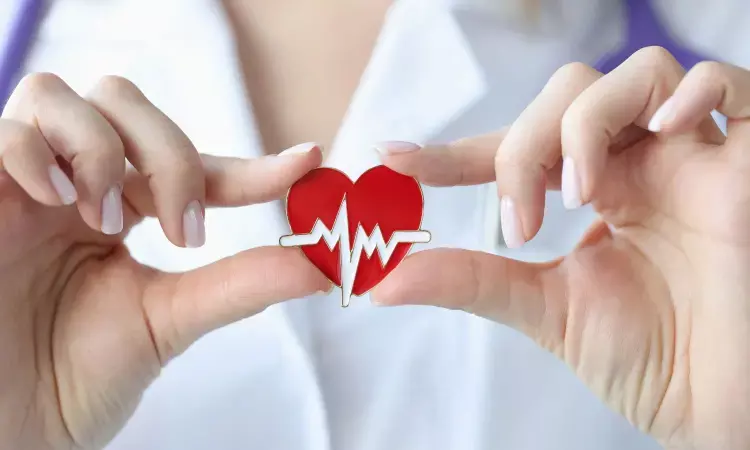- Home
- Medical news & Guidelines
- Anesthesiology
- Cardiology and CTVS
- Critical Care
- Dentistry
- Dermatology
- Diabetes and Endocrinology
- ENT
- Gastroenterology
- Medicine
- Nephrology
- Neurology
- Obstretics-Gynaecology
- Oncology
- Ophthalmology
- Orthopaedics
- Pediatrics-Neonatology
- Psychiatry
- Pulmonology
- Radiology
- Surgery
- Urology
- Laboratory Medicine
- Diet
- Nursing
- Paramedical
- Physiotherapy
- Health news
- Fact Check
- Bone Health Fact Check
- Brain Health Fact Check
- Cancer Related Fact Check
- Child Care Fact Check
- Dental and oral health fact check
- Diabetes and metabolic health fact check
- Diet and Nutrition Fact Check
- Eye and ENT Care Fact Check
- Fitness fact check
- Gut health fact check
- Heart health fact check
- Kidney health fact check
- Medical education fact check
- Men's health fact check
- Respiratory fact check
- Skin and hair care fact check
- Vaccine and Immunization fact check
- Women's health fact check
- AYUSH
- State News
- Andaman and Nicobar Islands
- Andhra Pradesh
- Arunachal Pradesh
- Assam
- Bihar
- Chandigarh
- Chattisgarh
- Dadra and Nagar Haveli
- Daman and Diu
- Delhi
- Goa
- Gujarat
- Haryana
- Himachal Pradesh
- Jammu & Kashmir
- Jharkhand
- Karnataka
- Kerala
- Ladakh
- Lakshadweep
- Madhya Pradesh
- Maharashtra
- Manipur
- Meghalaya
- Mizoram
- Nagaland
- Odisha
- Puducherry
- Punjab
- Rajasthan
- Sikkim
- Tamil Nadu
- Telangana
- Tripura
- Uttar Pradesh
- Uttrakhand
- West Bengal
- Medical Education
- Industry
Study reveals increased risk of arrhythmias including atrial fibrillation after COVID-19

Sweden: A recent study published in the European Heart Journal Open has revealed an increased risk of cardiac arrhythmias following COVID-19, particularly in elderly vulnerable individuals, and those with severe COVID-19.
Individuals infected with COVID-19 are also at an increased risk of suffering from heart rhythm disturbances, such as atrial fibrillation, according to a study at Umeå University, Sweden, which is one of the largest studies of its kind in the world.
"The results underline the importance of both being vaccinated against COVID-19 and that the healthcare system identifies people at increased risk of this type of complications so that the correct diagnosis is made and appropriate treatment is started in time," says Ioannis Katsoularis, first author of the study and cardiologist at University Hospital of Northern Sweden in Umeå.
The researchers were able to show that those who had been ill with COVID-19 could also suffer from heart rhythm disturbances, both in the form of so-called tachycardias, when the heart rate is high, and bradyarrhythmias, when the heart is slow so that a pacemaker is sometimes needed.
The study shows that the risk of atrial fibrillation and flutter was increased up to two months after infection. In the first month, the risk was twelve times greater than for people who did not suffer from COVID-19 infection.
Even the risk of a specific subset of tachycardias, paroxysmal supraventricular tachycardiaswas elevated up to 6 months after the infection and was five times greater in the first month. For the bradyarrhythmias, the risk was increased up to 14 days after the infection and was three times greater in the first month compared to subjects without COVID-19. Previous research in this area had not focused as much on which individuals are most at risk.
“We found that the risks were higher in older individuals, individuals with severe COVID-19 and during the first wave of the pandemic. We could also see that unvaccinated people were at higher risk than vaccinated people. Overall, the severity of the infection was the strongest risk factor," says Anne-Marie Fors Connolly, who leads the research group at Umeå University that is behind the study.
In the study, information from large national registers was cross-checked. All people who tested positive for the virus in Sweden from the start of the pandemic until May 2021 were included, but also a comparison group of individuals without a positive test for the virus. Over one million individuals with COVID-19 and over four million control individuals were included in this nationwide study, which is one of the largest of its kind in the world. Researchers at Umeå University have previously shown that COVID-19 leads to an increased risk of blood clots, myocardial infarction and stroke.
Reference:
Ioannis Katsoularis, Hanna Jerndal, Sebastian Kalucza, Krister Lindmark, Osvaldo Fonseca-Rodríguez, Anne-Marie Fors Connolly, Risk of arrhythmias following COVID-19: nationwide self-controlled case series and matched cohort study, European Heart Journal Open, Volume 3, Issue 6, November 2023, oead120, https://doi.org/10.1093/ehjopen/oead120.
Dr Kamal Kant Kohli-MBBS, DTCD- a chest specialist with more than 30 years of practice and a flair for writing clinical articles, Dr Kamal Kant Kohli joined Medical Dialogues as a Chief Editor of Medical News. Besides writing articles, as an editor, he proofreads and verifies all the medical content published on Medical Dialogues including those coming from journals, studies,medical conferences,guidelines etc. Email: drkohli@medicaldialogues.in. Contact no. 011-43720751


